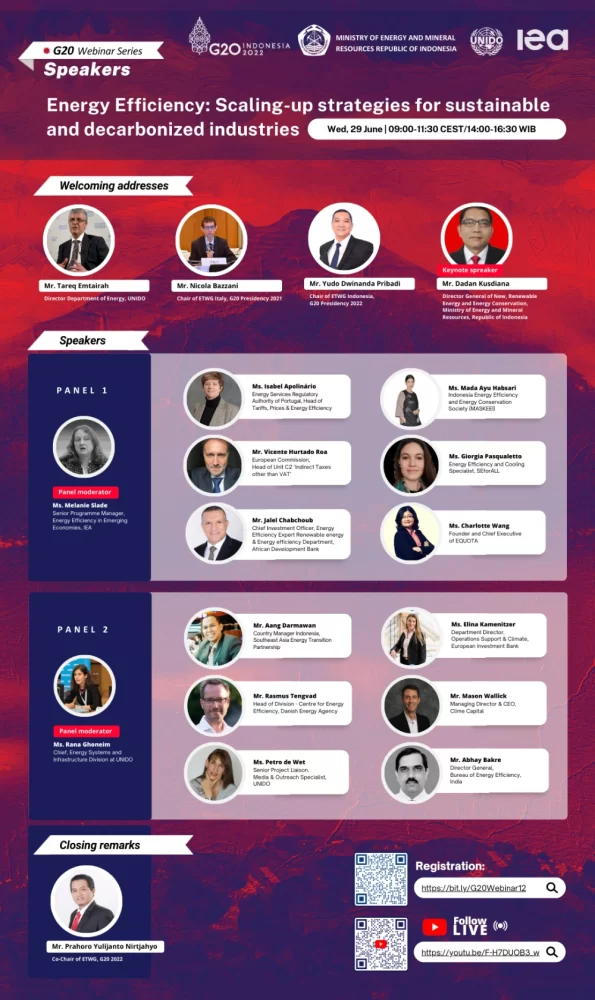Ahead of G20, eliminating energy waste across industry highlighted as critical decarbonization strategy
With industry among the biggest greenhouse gas emitters, curbing energy waste across this sector is key to a just and timely transition, the global Energy Transition Working Group (ETWG) concludes in the lead-up to the G20 in Bali, Indonesia, later this year.
The Indonesian presidency of the G20 has identified a Sustainable Energy Transition as one of its three priority issues. In the run-up to the annual G20 summit the ETWG is holding a series of events to explore the opportunities and challenges of achieving this. A two-panel webinar was held on 29 June, jointly convened by the Government of Indonesia, the International Energy Agency (IEA) and the United Nations Industrial Development Organization (UNIDO).
The panels discussed how reducing industrial energy waste can help meet critical decarbonization targets. Speakers representing governments, private sector start-ups, international organizations and regulatory bodies all came together to share experiences and know-how on stemming industrial energy loss, often using low-cost or no-cost methods.
Tareq Emtairah, the Director of UNIDO’s Department of Energy, opened the session by highlighting industry’s central role in achieving a just transition. Industry is among the largest emitters of greenhouse gases – second only to the energy sector – accounting for 40 per cent of all global emissions. Mr Emtairah noted that the sector is also at risk of supply chain disruptions, resource shortages, increased insurance costs and labour challenges because of the climate crisis. Even so, he sees opportunities for industry to lead the charge in the transition to a decarbonized economy.
Picking up this thread, the first panel made the case for energy efficiency as the “first fuel” in the transition to net zero. Reducing energy waste through efficiency improvements is widely acknowledged to be the most cost-effective decarbonization strategy. Efficiency is therefore a good way to ensure both an adequate and an affordable energy supply. As Melanie Slade, IEA Senior Programme Manager for Energy Efficiency in Emerging Economies said, “If we take the opportunities of energy efficiency, the economy grows 40 per cent and energy use goes down. If we don’t, energy use will go up by 30 per cent.”
Nevertheless, the potential of reducing energy waste remains largely untapped, especially in micro, small and medium-sized enterprises (MSMEs) and in developing countries. Several speakers highlighted the profound shortfall in available funding for projects in these areas, which can only be addressed through a radical scaling up of private investment. In Portugal, there has already been progress on this front: the government supplied 85 per cent of all funding for voluntary energy waste reduction initiatives in 2007; by 2018, this was down to 56 per cent. Entrepreneurs from the private sector demonstrated that technology and innovation can even reduce industrial energy waste and optimize operations while turning a profit. They emphasized, however, that the wider take-up of these measures would require a more supportive “ecosystem”. Clearly the public sector has a role to play here by creating demand, strengthening public investment and early de-risking of efficiency projects.
The second panel explored opportunities for governments, international organizations and civil society to play an active role in developing this ecosystem and creating the right conditions for private investment to thrive. There is also a role for the public sector to ensure effective communication around the benefits of eliminating waste. This can boost confidence and buy-in, especially within the financial sector, which ultimately funds these investments. The panellists also agreed that “policies work best in packages”. Governments succeed when they align all elements of their toolkit – regulation, information and incentives – towards a common goal.
Throughout the workshop, participants agreed on the immense potential of reducing industrial energy waste. As Isabel Apolinário quipped: “The best megawatt is the negawatt”. Rasmus Tengvad, of the Danish Centre for Energy Efficiency, expanded on this point, showing that “voluntary energy efficiency schemes in Denmark have saved 793GWh, US$55 million and 132Gt of CO2”.
Keynote speaker Dadan Kusdiana, from the Indonesian Ministry of Energy and Mineral Resources echoed this sentiment, proclaiming that “25 per cent of needed decarbonization could be achieved through energy efficiency alone”. The promise of efficiency as the “first fuel” is further bolstered by unprecedented fuel prices, pushing firms to economize. With this window of opportunity, and much of the technology and know-how already in place, Dadan Kusdiana concluded that the time to end industrial energy waste is now.
